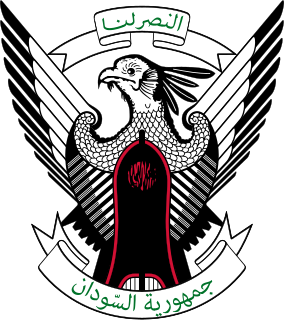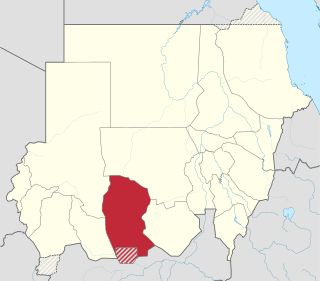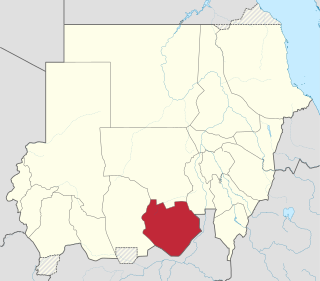
The foreign relations of Sudan are generally in line with the Muslim Arab world, but are also based on Sudan's economic ties with the People's Republic of China and Russia.

West Kordofan is one of the 18 wilayat or provinces of Sudan. In 2006 it had an area of 111,373 km² and an estimated population of approximately 1,320,405. Al-Fulah is the capital of the state.

South Kordofan is one of the 18 wilayat or provinces of Sudan. It has an area of 158,355 km² and an estimated population of approximately 1,100,000 people (2000). Kaduqli is the capital of the state. It is centered on the Nuba Hills. At one time it was supposed that South Kordofan was the only state in (North) Sudan suitable for producing oil, but oil has also been discovered in neighboring White Nile State in larger quantities.

The United Nations Mission in the Sudan (UNMIS) was established by the UN Security Council under Resolution 1590 of 24 March 2005, in response to the signing of the Comprehensive Peace Agreement between the government of the Sudan and the Sudan People's Liberation Movement on January 9, 2005 in Sudan.

The Economic Community of Central African States is an Economic Community of the African Union for promotion of regional economic co-operation in Central Africa. It "aims to achieve collective autonomy, raise the standard of living of its populations and maintain economic stability through harmonious cooperation".

The African Standby Force (ASF) is an international, continental African, and multidisciplinary peacekeeping force with military, police and civilian contingents that acts under the direction of the African Union. The ASF is to be deployed in times of crisis in Africa. Addis Ababa, Ethiopia, serves as the Force's Headquarters. Douala, Cameroon, was selected in 2011 as the site of the AU's Continental Logistics Base (LOGBASE).

The politics of South Sudan concern the system of government in the Republic of South Sudan, a country in East Africa, and the people, organisations, and events involved in it.
R. Stefan Templeton is the founder of the SPEAR Project.

Rebecca Nyandeng de Mabior is a South Sudanese politician. She has been one of the Vice Presidents of South Sudan in the unity government since February 2020. She served as the Minister of Roads and Transport for the autonomous government of Southern Sudan, and as an advisor for the President of South Sudan. She is the widow of Dr. John Garang de Mabior, the late first Vice President of Sudan and the President of the Government of South Sudan, and the mother of Akuol de Mabior. She is from the Dinka tribe of Twic East County of South Sudan.

A referendum took place in Southern Sudan from 9 to 15 January 2011, on whether the region should remain a part of Sudan or become independent. The referendum was one of the consequences of the 2005 Naivasha Agreement between the Khartoum central government and the Sudan People's Liberation Army/Movement (SPLA/M).

The Abyei Area is an area of 10,546 km2 or 4,072 sq mi on the border between Sudan and South Sudan that has been accorded "special administrative status" by the 2004 Protocol on the Resolution of the Abyei Conflict in the Comprehensive Peace Agreement (CPA) that ended the Second Sudanese Civil War. The capital of Abyei Area is Abyei Town. Under the terms of the Abyei Protocol, the Abyei Area was considered, on an interim basis, to be simultaneously part of both the Republic of Sudan and the Republic of South Sudan, effectively a condominium.

The Comprehensive Peace Agreement, also known as the Naivasha Agreement, was an accord signed on January 9, 2005, by the Sudan People's Liberation Movement (SPLM) and the Government of Sudan. The CPA was meant to end the Second Sudanese Civil War, develop democratic governance countrywide, and share oil revenues. It also set a timetable for a Southern Sudanese independence referendum.
The Darfur Peace Agreement may refer to one of two Darfur Peace Agreements that were signed by the Government of Sudan and Darfur-based rebel groups in 2006 and 2011 with the intention of ending the Darfur Conflict.
Sir Derek Plumbly is a British diplomat who has served throughout the Arab world. From 2012 to 2015, he served as the UN Special Coordinator for Lebanon.

Abyei is a border town currently in the Abyei Area that is disputed by Sudan and South Sudan. The U.N. estimated the town's population at around 20,000 previous to May 2011 events.

United Nations Security Council Resolution 1919, adopted unanimously on April 29, 2010, after recalling resolutions 1674 (2006), 1894 (2009) on the protection of civilians in armed conflict, 1612 (2005) and 1882 (2009) on children in armed conflict, 1502 (2003) on the protection of humanitarian and United Nations personnel, and 1325 (2000), 1820 (2008), 1888 (2009), and 1889 (2009) on women, peace, and security, the Council extended the mandate of the United Nations Mission in Sudan (UNMIS) until April 30, 2011 with the intention of renewing it further if necessary.

Southern Sudan was an autonomous region consisting of the ten southern states of Sudan between its formation in July 2005 and independence as the Republic of South Sudan in July 2011. The autonomous government was initially established in Rumbek and later moved to Juba. It was bordered by Ethiopia to the east; Kenya, Uganda, and the Democratic Republic of the Congo to the south; and the Central African Republic to the west. To the north lies the predominantly Arab and Muslim region directly under the control of the central government. The region's autonomous status was a condition of a peace agreement between the Sudan People's Liberation Army/Movement (SPLA/M) and the Government of Sudan represented by the National Congress Party ending the Second Sudanese Civil War. The conflict was Africa's longest running civil war.

Abyei District was a former district of Sudan, considered part of the state of West Kurdufan. Upon the dissolution of West Kurdufan in 2005, it was included in the state of South Kurdufan. Its administrative centre was the town of Abyei.
United Nations Security Council Resolution 1784 was unanimously adopted on 31 October 2007.
United Nations Security Council Resolution 1870, unanimously adopted on 30 April 2009, extended the mandate of the United Nations Mission in Sudan for another year urging all parties to comply fully with the 2005 Comprehensive Peace Agreement that ended a 21-year civil war between north and south Sudan.















